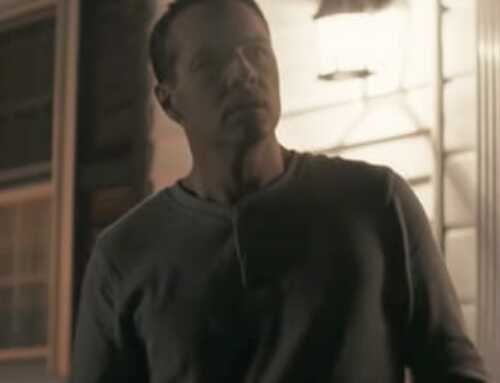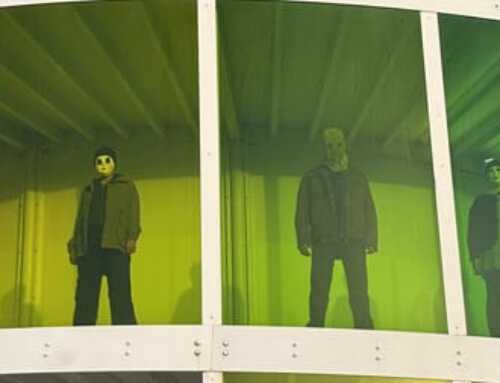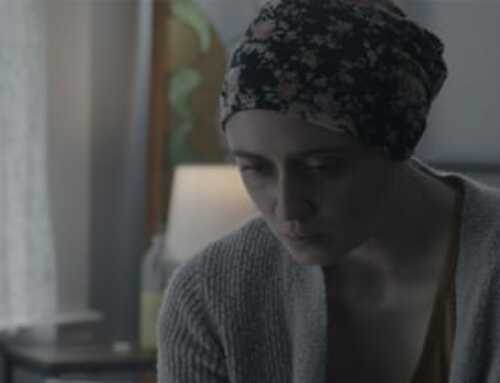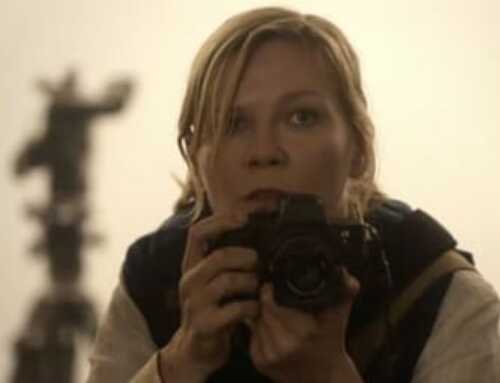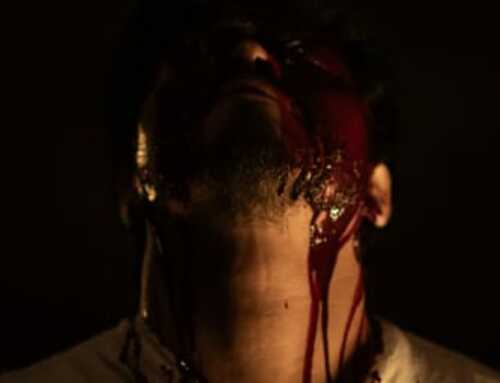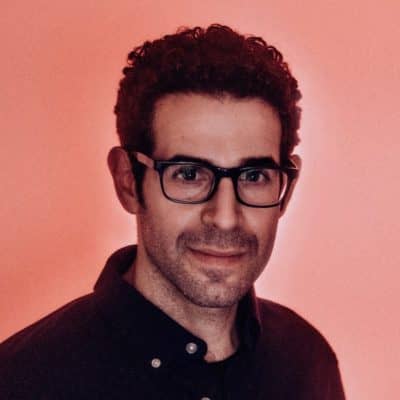 I called Ronen Landa, composer for 1BR, at his home in LA to discuss how he went about scoring the film and about film scoring in general.
I called Ronen Landa, composer for 1BR, at his home in LA to discuss how he went about scoring the film and about film scoring in general.
Scix: Hello, Ronen.
Ronen: Hello, how are you?
Scix: I’m doing good, all things considered. So, how did you wind up with 1BR?
Ronen: I got involved with 1BR because I happen to know one of the producers, and he knew that I had scored a few horror films in the past. We’re pretty close friends, and so he sent my music over to David Marmor, the director, and some of the other producers. They liked the music we had a meeting. I read the script and then I saw some early cuts, and we started to just jump into the waters together. I ended up working really, really closely with the director and we became extremely good friends through the whole process of scoring the project. It was a great experience, not only to get to work with my friends but also make new friends and really develop this new artistic bond, which is what I live for.
My music for films like The Pact and At the Devil’s Door, you know, were very appropriate kind of templates for this project in a way so we kind of started from there.
Scix: As a movie it definitely benefits from some of the more subtle things you do with the music. I don’t know if it’s rude to compare you to other composers but in the opening scene I got kind of a Wendy Carlos vibe, from the Shining. And I loved how in that very opening scene everything was very pleasant and the music’s fairly pleasant, but slightly, slightly discordant. I think it was great at subtly building tension. I think that shows a great amount of restraint.
Ronen: I appreciate someone noticing that goes on, because we worked hard on all that. It was actually the first piece of music I wrote for this film. Very often when scoring for a character, especially when it’s a horror sequence or an action sequence, everything has to be extremely hyped for the hype. But that scene I really just wanted to imagine by myself at the piano. That’s what I did, I sat down at the piano and thought about the character Sarah (Nicole Brydon Bloom) and thought about her journey, about where she was at the beginning of all this, and where she wound up.
There’s a very subtle harmonic turn in that scene, and as we make that turn, some more uncanny sounds creep in. As I was then adapting the theme to the picture, it just ended up working out perfectly because exactly where that turn happened, there was an opportunity to start bringing in some subtle textures that were a little off, weren’t quite right. And that’s exactly what we’re trying to do.
It shows even some of her optimism, but also a bit of her sadness. When you watch the film you understand that she comes to LA because of some difficult things she went through. And so this was a bit of optimism, but also a bit of sadness. There’s room for just a touch of foreshadowing, and you know we brought it in there.
Thank you for noticing all that.
Scix: Yeah, well I mean, it worked very well for me at least.
Ronen: And I’ll take comparisons. I love hearing when we can hear of a composer that people are reminded of, and it wasn’t the one that I was thinking of at all. And, and it’s really interesting to hear just how these pieces of media kind of resonate, being part of a history of films scoring and I get a kick out of it. I love being part of that tradition.
Scix: Okay, let’s see how you how you feel about the next one!
I’m guessing the noises at night that wake her up there, they sound like they’re coming from you as well, aren’t they?
Ronen: That’s an interesting question because a couple people have asked me that. So the pipes themselves are sound design, in the sound designer’s corner.
But there is score accompanying, and the way they the score work is that when the pipes first start, the score is extremely, extremely subtle. It’s really giving just a little bit of ambience. As the pipes become more and more intense, elements of those metallic sounds and some of that screeching starts permeating in the score itself. I didn’t use pipes, but I found other instruments create a certain mirror effect, like if you’re looking at a reflection in a pool and it’s totally different.
It’s not the actual pipes, but I found instruments that allowed me to create these metallic sounds, and really create a world where, because the score is always in Sarah’s mind, in a way, it’s always reflecting her psychology and her emotional state. But it really becomes a feeling of, are these pipes, even real or is it all in her head? That was what we were going for with it. It’s really interesting when people ask because they feel like score. It’s cool that we managed to create that effect I think.
Scix: It sounded like you were possibly abusing some stringed instruments.
Ronen: I’m always trying to find a good instrument to abuse.
Scix: The other composer I was gonna name drop was, that that combination of the pipes and the score gave me a strong (Silent Hill composer) Akira Yamaoka vibe.
Ronen: Oh wow, okay.
I let all the comparisons wash over me. Don’t expect me to give you too much on them.
Scix: Fair enough.
Ronen: It’s always really interesting to hear, and I think a lot of a lot of music in the last 50, 60 years has been about exploring the darker corners and outer edges of instrumental possibilities. The way that Beethoven or Shostakovich used the cello might not be the way that I use the cello. And we find we find new sound to draw out of these instruments. And you actually have to be careful about making sure that you’re protecting the instrument itself, you know, to the extent that there’s room to create kind of crazy sounds out of these traditional instruments, and that would be really exciting because, in a way, it’s familiar, and in a way it’s totally surprising and disorienting.
Scix: It worked really well for me! How much direction did you get? Or more specifically, toward the end, I noticed the music seems pretty light after [spoiler redacted], and that’s an interesting choice.
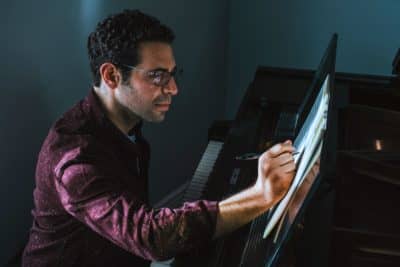 Ronen: Yeah, after that section you mentioned the music really follows more more in the lines of a more traditional dramatic score rather than horror score, so maybe a more traditional thriller, but not really a horror thriller
Ronen: Yeah, after that section you mentioned the music really follows more more in the lines of a more traditional dramatic score rather than horror score, so maybe a more traditional thriller, but not really a horror thriller
But I know what you’re getting at. All of a sudden after this is very very very dark turn, and we turn into a much more psychological exploration of Sarah’s character, and that actually, if you ask me, is the real beauty of this film as a film. I feel that that’s the really beautiful part of the movie, when the film starts going in a direction that becomes really interesting, forcing the audience to ask themselves some really interesting questions: how would you respond under this level of pressure, how would you deal with something that upended you? That is such a relevant question to all of us right now in this pandemic, right? Because we’re essentially being forced into new into a new way of life that nobody asked for.
So, how do you respond, where do you find your individuality, and how do you respond to the pandemic? Where’s your level of acceptance? And what are the boundaries of that, and what are the limits for that? That’s a really interesting question. Some people are kind of a little bit more superficial about this metaphor of the moment, we’re all stuck in our apartment and Sarah’s stuck in her apartment too, but I actually think it runs deeper than that and. And it’s a really interesting moment to be asking that. But yeah the score really does turn at that moment until there’s an opportunity later to kind of bring back some of the intensity.
Scix: So, as the composer, how much of that interpretation you were just sharing with me was given to you, and how much of that is you watching the film and that’s your take on it and you put that into the music?
Ronen: It’s such an interesting question because it becomes a little bit of a blur with the particular nature of the collaboration that you have with the director. And in this case that collaboration was so natural, so organic that I really feel like we were both speaking the same language the whole time. So I don’t remember what exactly came from where.
But I will tell you: at this point, I don’t think any composer doing film won’t have a test score. But in this case I was actually involved in the score for this film. But there was a test score, and some of that was suggested by that score. But the truth is that the test score in some of those scenes went a little further towards the horror-forward approach. I suggested that we pull back on it a little bit, but I don’t want to take all the credit for it because they could have pushed back on that.
I remember we were a couple of cues that we had to find the right balance, and and that’s always the trick. But it was very clear that that the thrust of the story needed to change there. That should be reflected in the score. They were very very very open to my ideas and. The temp score is always just that, just the temporary, and it wasn’t meant to be dictating anything, necessarily.
Scix: What do you think people should know that I haven’t thought to ask about?
Ronen: That is a good question.
One thing I really want to point out is that a score is a collaboration with the filmmaker, and that’s obviously key, but it’s also a big collaboration with the instrumentalists. In a score like this that is especially true because you’re working on developing some really out-there sound. When you’re working with instrumentalists they’re gonna know even if you’re a well studied composer, there’s, there’s always room to learn. There are instrumentalists out there that are just out of this world. They’re going to know their instruments really well, and being in collaboration with them is so edifying, and it’s one of the parts of the process that I really look for. We had a tremendous pianist, her name is Carolyn, we had a wonderful brass section and, and we had these amazing experimental sessions with super low woodwinds, which was just maybe one of the most epic, awesome sessions I’ve ever attended. And I got to know conduct it, so even better! I think we had something like 30 feet of pipe in and around with all these huge instruments.
But all these all these players: Carolina played with such sensitivity and our harp player Jill was phenomenal. These players are so critical to really bring your score alive, and I can’t say enough about what it means to work with musicians who inspire me as much as the filmmakers who inspire me. So it’s a really, it’s a really kind of lucky spot to be in.
Scix: Thank you very much.
Ronen: I really appreciate it. When they put you in touch with people you never know if they’ve actually listened to the music or paid any attention to it very clearly. You did your homework and I really appreciate that, it makes it feel like we’re talking about something.
Scix: You’re very welcome, thank you. All right, well, until we meet again–
Ronen: Hopefully we’ll be at Sundance Midnight sometime.
Scix: Oh yes. Let’s do that. Yeah. The world should be more reasonable by then. Good night. Good night.
Ronen Landa’s original score to the upcoming horror film, 1BR is getting a digital release on April 29, 2020 by Lux/Eon Records. The film, written and directed by David Marmor, is getting distributed by Dark Sky Films on April 24, 2020. The film stars Nicole Brydon Bloom, Naomi Grossman, Giles Matthey, Taylor Nichols, Alan Blumenfeld, Celeste Sully, Susan Davis, Clayton Hoff, and Earnestine Phillips. Some of Landa’s other credits include IFC Midnight’s At the Devil’s Door and IFC Films’ The Pact, which originally premiered at the Sundance Film Festival. The score consists of 25 tracks and will be available on all major digital sites including iTunes, Spotify, Bandcamp, Amazon and Apple Music.


